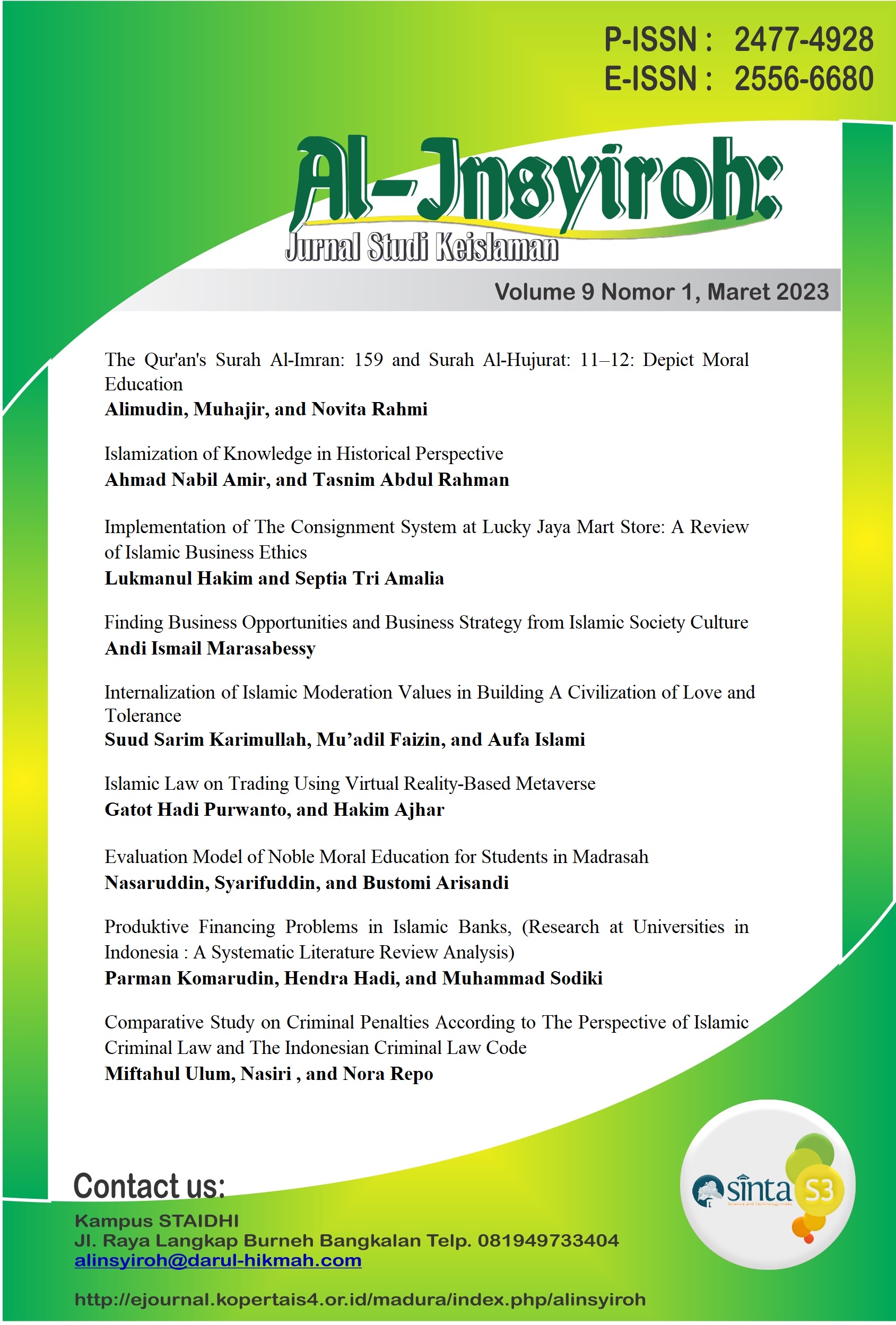Internalization of Islamic Moderation Values in Building a Civilization of Love and Tolerance
DOI:
https://doi.org/10.35309/alinsyiroh.v9i1.6345Keywords:
Islamic Moderation Values, Civilization, Love, ToleranceAbstract
The purpose of this research is to obtain information about the pattern of internalization of Islamic moderation values in building a civilization of love and tolerance by harbouring all the differences that can create hostility and disharmony amid a pluralistic social life. This research is library research because all the data used as material for conducting studies comes from texts or manuscripts that have become library collections using qualitative research methods and analyzed with the nature of descriptive analytic studies. The results of this study state that Islamic moderation values in their implementation in social life as an effort to prevent various extremist, fundamentalist, liberal and radical understandings that are very far from Islamic teachings, which are full of love and tolerance. Love and tolerance are important provisions in forming civilization in a harmonious religious life without any conflict due to diversity. Love can also foster harmony in religious, national and state life, thus creating peace in society. Love makes a person have good morals who always want peace so that he always pleases others in every word and behaviour. Meanwhile, with better tolerance, constructive and efficient dialogue will be built, which can foster religious attitudes and an atmosphere that is more open, plural, and inclusive.References
Abdullah, Muhammad, and Muhammad Junaid Nadvi. “Understanding the Principles of Islamic World-View.†Dialogue (Pakistan) 6, no. 3 (2011).
Abdurrahman Bin Abdul Aziz Al-SudÄis. BÅ«lÅ«ghul Ä€mal Fi Tahqiq Al-Wasathiyah WÄ Al-I’tidÄl. RiyÄdh: Madar al-WathÄn li al-NasyÄr, 2017.
Amin, M Yakub. “Komunikasi Dan Demokrasi, Pilar Utama Membangun Moderasi Islam.†At Tabsyir: Jurnal Komunikasi Penyiaran Islam IAIN Kudus, 7 (1), 81 107 (2020).
Chittick, William. “Love in Islamic Thought.†Religion Compass 8, no. 7 (2014): 229–238.
Fairuz Abadi. Al-QÄmus Al-MukhÄ«th. Kairo: Dar el-Hadits, 2008.
Faizah, Rohmatul. “Penguatan Wawasan Kebangsaan Dan Moderasi Islam Untuk Generasi Millenial.†Jurnal PROGRESS: Wahana Kreativitas Dan Intelektualitas 8, no. 1 (2020): 38–61.
Helmy, Muhammad Irfan, Ahmad Darojat Jumadil Kubro, and Muhamad Ali. “The Understanding of Islamic Moderation (Wasatiyyah Al-Islam) and the Hadiths on Inter-Religious Relations in the Javanese Pesantrens.†Indonesian Journal of Islam and Muslim Societies 11, no. 2 (2021): 377–401.
Hermawan, Ajib. “Nilai Moderasi Islam Dan Internalisasinya Di Sekolah.†INSANIA: Jurnal Pemikiran Alternatif Kependidikan 25, no. 1 (2020): 31–43.
Ibnu Faris. “Mu’jam MaqÄyis Al-Lughoh.†Vol. III. Kairo: Maktabah al-Khanji, 1981.
Ikhsan, M Alifudin. “Al-Quran Dan Deradikalisasi Paham Keagamaan Di Perguruan Tinggi: Pengarusutamaan Islam Wasathiyah.†Al-Bayan: Jurnal Ilmu al-Qur’an dan Hadist 2, no. 2 (2019): 98–112.
K. Ali. Sejarah Islam (Tarikh Pramodern). Jakarta: PT RajaGrafindo Persada, 2003.
Karen Armstrong. A History of Yerusalem: One City Three Faiths. London: Harper Collins Publishers, 1997.
Karimullah, Suud Sarim. “Internalisasi Nilai-Nilai Keislaman Berbasis Wawasan Kebangsaan Dalam Sistem Pendidikan.†Jurnal Studi Islam Lintas Negara (Journal of Cross Border Islamic Studies) 3, no. 2 (2021): 66–74.
———. “The Urgency of Building Legal Awareness in the Bond of Love in Youth.†Jurnal Paris Langkis 2, no. 2 (2022): 1–10.
Kuhlthau, Carol Collier. Teaching the Library Research Process. New York: Rowman & Littlefield, 2002.
Lestari, Risma Savhira Dwi, and Alaika M Bagus Kurnia PS. “Konsep Wasathiyyah Dan Relavansinya Bagi Pemuda Dalam Menangkal Aliran Sesat.†Analisis: Jurnal Studi Keislaman 19, no. 2 (2019): 321–338.
M. Quraish Shihab. Tafsir Al-Misbah: Pesan, Kesan Dan Keserasian Al-Quran. Vol. 8. Jakarta: Lentera Hati, 2002.
Massoweang, A K. “Merajut Moderasi Beragama Dari Tradisi Pesantren.†Jurnal Khazanah Keagamaan 8, no. 2 (2020): 211–226.
Mian, Ali Altaf. “Love in Islamic Philosophy.†The Routledge handbook of love in philosophy (2019): 395–408.
Muhammad Imarah. Al-Samâhah Al-Islâmiyyah: Haqīqatu Al-Jihâd, Wa Al-Qitâl, Wa Al-Irhâb. Kairo: Maktabah Syuruq al-Dauliyyah, 2005.
Muhammad Thantawi. Al-TafsÄ«r Al-WasÄ«th Li Al-Qur’Än Al-KarÄ«m. Kairo: Dar Sa’adah, 2007.
Nafisi, Shadi. “Tolerance in Islam.†HTS Teologiese Studies/Theological Studies 74, no. 3 (2018).
Van der Noll, Jolanda, and Vassilis Saroglou. “Anti-Islam or Anti-Religion? Understanding Objection against Islamic Education.†Journal of Ethnic and Migration Studies 41, no. 2 (2015): 219–238.
Nur, D A, and L Mukhlis. “Konsep Wasathiyah Dalam Al-Quran (Studi Komparatif Antara Tafsir Al-Tahrîr Wa at-Tanwîr Dan Aisar at-Tafâsîr)(The Wasathiyah Concept in the Al-Quran (Comparative Study between Tafsir Al-Tahrir and Aisar at-Tafasir). An-Nur, 4 (2), 205–225,†2015.
Nur, Iffatin, A Hasyim Nawawie, Hiba Fajarwati, and Hani Chusna. “Embracing Radicalism and Extremism in Indonesia with the Beauty of Islam.†Asian Research Journal of Arts & Social Sciences 10, no. 2 (2020): 1–18.
Nurcholish Madjid. Islam Doktrin Dan Peradaban. Jakarta: Paramadina, 1992.
Rahmad Asril Pohan. Toleransi Inklusif: Menapak Jejak-Sejarah Kebebasan Beragama Dalam Piagam Madinah. Yogyakarta: Kaukaba Dipantara, 2014.
Rahmawati, Rahmawati. “Cinta Dalam Pandangan Sufisme.†Al-MUNZIR 6, no. 2 (2013).
Ramdhan, Tri Wahyudi. "Kesetaraan Gender Menurut Perfektif Islam." Al-Insyiroh: Jurnal Studi Keislaman 1.1 (2015): 70-86.
Ramdhan, Tri Wahyudi. "Dimensi Moderasi Islam." Al-Insyiroh: Jurnal Studi Keislaman 2.2 (2018): 29-48.
Ridho, Ali, and Thibburruhany Thibburruhany. “Prinsip Toleransi Beragama Sebagai Pondasi Membangun Peradaban Islam Di Era Modern.†El-Afkar: Jurnal Pemikiran Keislaman dan Tafsir Hadis 8, no. 1 (2019): 75–94.
Ritonga, Apri Wardana. “Konsep Internalisasi Nilai-Nilai Moderasi Beragama Bagi Generasi Milenial Berbasis Al-Qur’an.†al-Afkar, Journal For Islamic Studies 4, no. 1 (2021): 72–82.
Rusydiyah, Evi Fatimatur, and Eka Wahyu Hidayati. “Nilai-Nilai Toleransi Dalam Islam Pada Buku Tematik Kurikulum 2013.†ISLAMICA: Jurnal Studi Keislaman 10, no. 1 (2015): 277–297.
Saumantri, Theguh. “Nilai-Nilai Moderasi Islam Perspektif Wahbah Az-Zuhaili Dalam Tafsir Al-Munir.†Diya al-Afkar: Jurnal Studi al-Qur’an dan al-Hadis 10 (2022): 135–154.
Sayyid Sabiq. Fiqh As-ÂSunnah. Vol. III. Bairut: DÄr al-Fikr, 1981.
Sugitanata, Arif. “Islam Wasthiyyah Dalam Kaca Mata Tafsir Al-Qur’an.†Rausyan Fikr: Jurnal Ilmu Studi Ushuluddin Dan Filsafat 16, no. 1 (2020): 191–211.
Wafer, Jim. “The Symbolism of Male Love in Islamic Mystical Literature.†Islamic Homosexualities: Culture, History, and Literature (1997): 107.
Wildemuth, Barbara M. Applications of Social Research Methods to Questions in Information and Library Science. California: Abc-Clio, 2016.
Yildirim, Yetkin. “Peace and Conflict Resolution in the Medina Charter.†Peace Review: A Journal of Social Justice 18, no. 1 (2006): 109–117.
———. “The Medina Charter: A Historical Case of Conflict Resolution.†Islam and Christian–Muslim Relations 20, no. 4 (2009): 439–450.
Yusuf al-Qaradhawi. Fatâwâ Mu’âshirah. 3rd ed. Manshurah: Dar al-Wafa’, 1994.
Zuhairi Misrawi. Pandangan Muslim Moderat: Toleransi, Terorisme, Dan Oase Perdamaian. Jakarta: Kompas, 2010.
Сафиназаров, ИÑмоил. “IS Religious Tolerance, Unity of Knowledge and Faith Issues Highlighting in Imam Bukhari Hadiths.†Ðрхив научных иÑÑледований, no. 19 (2020).
Downloads
Published
How to Cite
Issue
Section
License
Copyright (c) 2023 Al-Insyiroh: Jurnal Studi Keislaman

This work is licensed under a Creative Commons Attribution-ShareAlike 4.0 International License.

This work is licensed under a Creative Commons Attribution-ShareAlike 4.0 International License.









